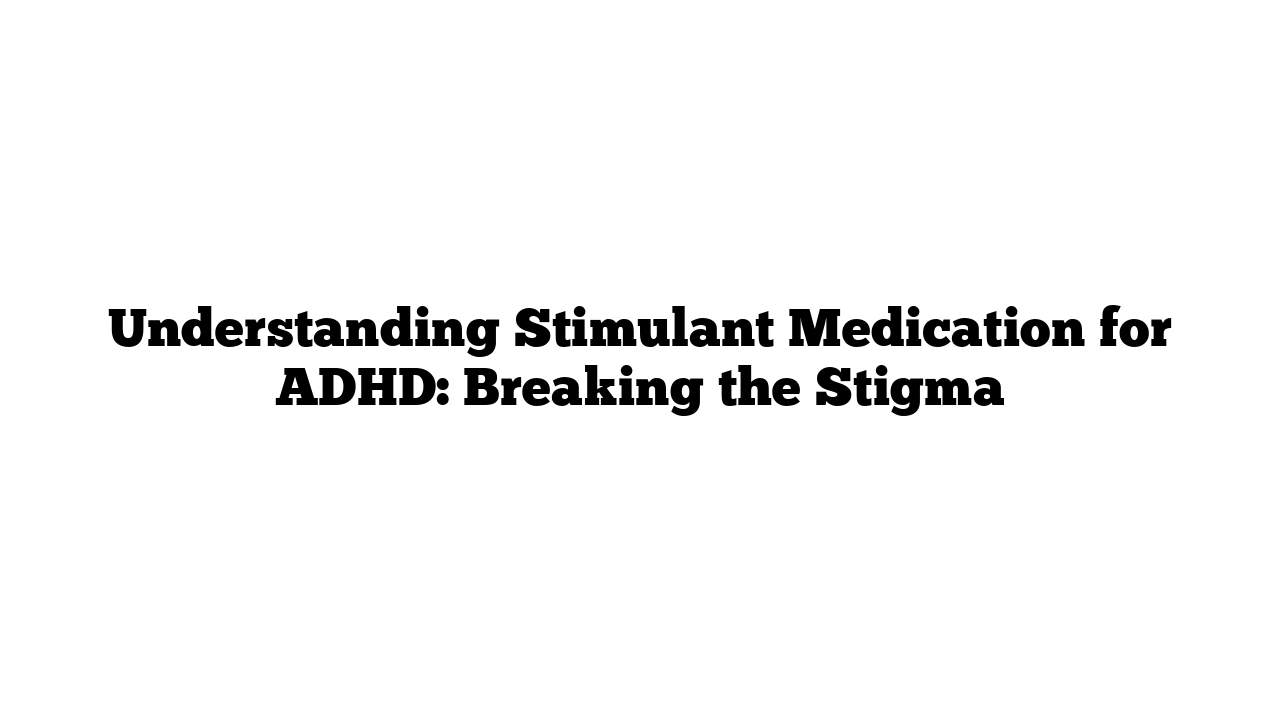October is ADHD Awareness Month, a perfect time to discuss stimulant medication for ADHD and the stigma surrounding it. This article aims to shed light on why stimulant medications are commonly used and address the misconceptions that often lead to shame and doubt among those who need treatment.
What Are Stimulant Medications?
Stimulant medications, such as Adderall and Ritalin, are the most frequently prescribed treatments for Attention Deficit Hyperactivity Disorder (ADHD). They are considered first-line treatments because they help manage symptoms effectively.
How Do They Work?
These medications work by increasing the levels of dopamine and norepinephrine in the brain. Both neurotransmitters are crucial for attention, focus, and impulse control. While skills training and behavioral interventions are essential, stimulant medications support these strategies by making it easier for individuals to use their skills in daily life.
Benefits of Stimulant Medications
- Improved Focus: They help individuals concentrate better, allowing for more productive work and study sessions.
- Reduced Impulsivity: These medications can help manage impulsive behaviors, leading to better decision-making.
- Enhanced Daily Functioning: By controlling symptoms, individuals can perform better in school, work, and personal relationships.
The Stigma Surrounding ADHD Medications
Despite the benefits, there is a significant stigma attached to stimulant medications. This stigma often stems from misconceptions and negative portrayals in the media.
Common Misconceptions
- Addiction Risk: Many people believe these medications are addictive. However, when used correctly and under medical supervision, the risk of addiction is low.
- Parental Failure: Some view the need for medication as a failure in parenting. This belief can lead to unnecessary guilt and shame.
- Moral Judgments: ADHD is sometimes seen as a character flaw or a lack of discipline, rather than a legitimate medical condition.
The Impact of Media
Media representation can be misleading. For instance, stimulant medications are often equated with illegal drugs like methamphetamine or cocaine, which is not accurate. While they are classified as stimulants, the effects and purposes differ significantly. Such portrayals can foster fear and misunderstanding among parents and individuals with ADHD.
Why Education Matters
It’s crucial to educate ourselves and others about ADHD and its treatment options.
Real Experiences Matter
Many individuals and families face pressure from society, including comments from well-meaning friends and relatives. As one person shared, “It’s disheartening when people suggest I can manage ADHD without medication.” This narrative minimizes the struggles faced by those living with ADHD.
Seeking Help
Research shows that untreated or poorly managed ADHD can lead to additional challenges, including addiction and mental health issues. In fact, studies indicate that those with untreated ADHD may turn to substances like nicotine or cannabis as a form of self-medication.
Expert Insights
Dr. Carolyn Lentzsch-Parcells, a board-certified pediatrician and ADHD specialist, emphasizes that medication is a critical component of ADHD treatment. She states, “Stimulant medications help improve brain function, allowing individuals to utilize their unique gifts effectively.”
The Role of Healthcare Providers
Healthcare providers play a vital role in dispelling myths. They can guide families in making informed decisions about medication, ensuring it is used safely and effectively.
Embracing Treatment Choices
Choosing to use stimulant medication is not a failure; it’s a step toward better management of ADHD.
Advocacy and Support
Advocating for oneself or a child is essential. It’s important to seek the best possible treatment options, whether that involves medication, therapy, or lifestyle changes. Remember, “Asking for help is a sign of strength, not weakness.”
Encouraging Open Dialogue
Open discussions about ADHD treatment can help reduce stigma. Sharing personal stories and experiences can foster understanding and support within the community.
Take Action
If you or someone you know is navigating ADHD, consider exploring your options. Educate yourself and others about the realities of ADHD treatment.
To learn more about ADHD and effective management strategies, visit medicaltimes.io. Together, we can work towards reducing stigma and promoting better understanding of ADHD treatments.
For further reading, check out these resources:
By sharing knowledge and experiences, we can create a more supportive environment for those affected by ADHD.
